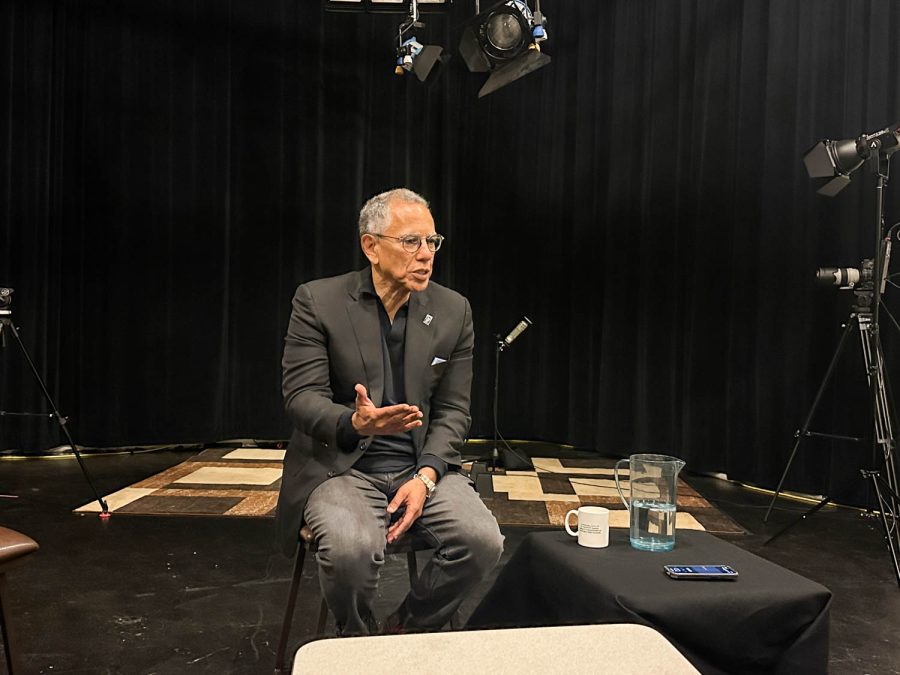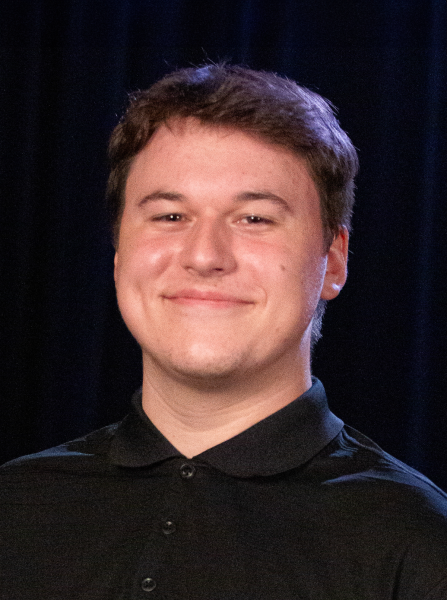Dean Baquet receives Murrow Lifetime Achievement Award at 47th Symposium
Former New York Times editor speaks on objectivity, future of journalism
Baquet now leads an investigative fellowship through the New York Times
April 6, 2023
From winning Pulitzer Prizes, serving as executive editor at the Los Angeles Times and New York Times to now taking on a new ambitious fellowship program, Dean Baquet has made the most of his several-decade-long career as a journalist.
For his dedication to journalism and his fight for truth and objectivity, Baquet was awarded the Murrow Lifetime Achievement Award Tuesday at the 47th Murrow Symposium. He gave a keynote address when he received the award as well as being a part of several other sessions throughout the day.
Students and faculty alike were given the opportunity to ask Baquet questions about his career on a national and local scale, questions about the decisions he’s made throughout his career and learn more about the professional industry.
Objectivity was a common theme in the questions asked, the dedicated theme of one of his sessions. Baquet challenged the idea that individuals themselves can be objective. He said that no one is and no one can possibly be.
“When I am editing a story or recording a story I go into it with my baggage. Objectivity is a process. It is a process that was created to make sure everybody’s baggage did not skew coverage. So objectivity is the process of being edited, a news organization testing the truth of what is being published,” he said.
Baquet’s personal definition of being truly objective is to approach a story with empathy and an open mind and to be willing to take information that challenges beliefs.
Brought up alongside objectivity was the fear of upsetting people, an idea that he said if journalists are too afraid to publish something due to the possibility of someone being upset, then at that point it is no longer journalism.
During his time at the New York Times, he said he had been approached by people in powerful positions several times about not publishing a story due to a “national security risk” Only once did he listen and not publish a story. Looking back, he said he never regretted publishing a story, only ever regretted not publishing the one.
Baquet does not have many regrets about his career in general, from being a journalist to having dropped out of college, to working long extensive days in his early career, These were all steps that he looks fondly on when reflecting on his career.
“I’ve never regretted going into journalism. I’ve had times where I was not happy. Sometimes you get a bad job, sometimes you have a bad boss; sometimes you’re behind on a story so you’re going to have ups and downs in your career. But I have never thought about doing anything else,” Baquet said.
Outside of journalism, Baquet is proud of a moment in his life when his son had a kart race across the state of California on the same day as a big story breaking, yet Baquet took his son to the race anyway.
“I am proud of that because that is something I would not have done as a younger journalist. I am proud of him a lot and his achievements,” he said.
His advice for younger journalists is to find that work-life balance sooner than he had, as taking his son to a kart race is not something he would have done early in his career but would recommend we do.
“Your generation demands more work-life balance, and I think my generation could use some lessons on work-life balance and my generation could have thought more about having interests outside of journalism,” Baquet said.
If young journalists are to take anything away from Baquet’s generation, he said that they should look at their principles and be dedicated to fair reporting.
“My generation has a strong sense of our core principles of independence, non-partisanship, objectivity, a true belief in reporting and empathy were things my generation worked really hard on and you can take away,” he said.
Baquet said he believes journalism is better when the reporter is connected and cares about the community they are reporting on, something he plans to help with as he takes on a new role in a fellowship program.
The program is taking investigative journalists from around the country and editing their local investigative stories to publish. Rather than nationalizing the stories, they are being kept local for the local audience. They will be written by people who also are affected in the same way that the readers are affected, something Baquet said makes journalism better.






















